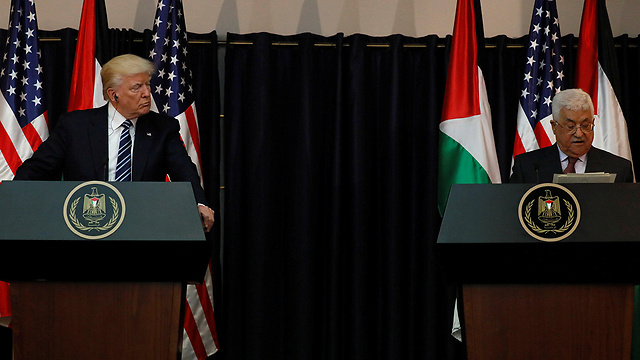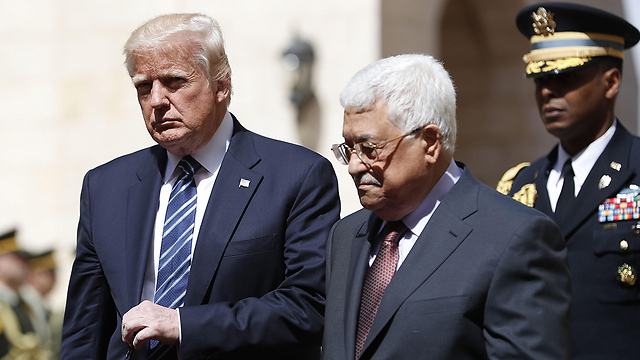

Trump’s Mideast ‘achievement’: A growing rift with the Palestinians
Op-ed: It’s hard to estimate how long Donald Trump will survive in office, but even if he goes, the deep change he led in the US policy towards the current Palestinian leadership will reverberate for years; that leadership is finished and it’s time to replace it, just like it’s time to replace our own leadership.
The White House brat, commentators said, is truculent and will pull out the heavy baton and wave it in front of the terrified eyes of Prime Minister Benjamin Netanyahu and his government ministers.
The eager anticipation for Trump’s “deal” grew on the eve of his trip to Israel and Saudi Arabia, with a ridiculously short visit to Bethlehem.
The rumors and preparations for the upcoming deal didn’t quiet down even when it turned out that the president had come and gone empty-handed. On the contrary, they only increased. Look, Trump is sending over his Mideast envoy. Look, he’s about to send his omnipotent son-in-law. Look, he posted a vague tweet which may imply that he intends on claiming a price from Israel. But the envoy just went back and forth with nothing to do, the son-in-law got caught up in investigations related to his Russian affair, and the “mysterious tweet” turned out to be another grammatical error. Trump hasn't mastered his mother tongue and often makes spelling mistakes and uses the wrong tense.
I’m not saying Trump didn’t do anything in our region. He definitely did something: He got into a major fight with the Palestinian leadership. The rift, which seemed partial and concealed during the quick visit he paid Palestinian President Mahmoud Abbas in Bethlehem, burst forth in all its might later on and is reaching its climax these days.
In his first year as president, Trump recognized Jerusalem as Israel’s capital, exerted financial pressure to prevent an Israeli defeat at the United Nations, removed representatives of the ideological Right with the anti-Semitic flavor from his close circle in favor of his Jewish family, and recently demanded that the Palestinians return to the negotiating table unconditionally, otherwise the US would cut its financial aid.
This threat is substantial: In recent years, the United States has become the Palestinian people’s biggest helper. Directly and indirectly, it transfers to the territories between $800 million to $1 billion a year. Arab states have almost entirely halted their aid to the Palestinians. Over the weekend, we learned that the US had frozen $125 million in funding to the United Nations Relief and Works Agency (UNRWA), the agency founded by the UN to provide temporary aid to Palestinian refugees, which over the years became an exclusive supplier of basic welfare service in the refugee camps.
Trump’s White House likes to quote President Bill Clinton’s warning to his successor, George W. Bush: Don’t believe a word the Palestinian leadership tells you. Bush likely passed the warning on to Barack Obama, who passed it on to Trump. Obama saw himself as the most significant friend the Palestinians had in the White House—but their leaders, according to his associates, repaid him with selfishness and foolishness and thwarted his efforts to reach an agreement. Obama was seriously offended.

Trump obviously didn’t need his predecessors’ warnings. His entire conduct vis-à-vis the Palestinians leads to only one conclusion: Trump simply can’t stand them. He completely rejects the national Palestinian narrative and is willing to take steps against them that are so radical that even the Netanyahu government has its reservations. The reconciliation between Fatah and Hamas is interpreted by his associates as a Hamas takeover of Fatah—the end of a possible “deal.”
Trump, let me remind you, isn’t any different from most Americans when it comes to this issue: Sympathy towards the Palestinians has hit a low point in US public opinion polls, not just among members and supporters of the Republic Party, but also among members and supporters of the Democrats, although the latter are also demonstrating a considerable drop in sympathy towards Israel.
It’s hard to estimate how long Trump will survive in office. Now that journalist Michael Wolff’s revealing book “Fire and Fury” has been published, the American political discourse has begun focusing on the question of his personal performance rather than on his policy. The book also claims, according to Trump’s former advisors, that he supports the “Jordanian option”: Handing sovereignty over the West Bank to Jordan and sovereignty over Gaza to Egypt—rather than to the Palestinians.
Even if Trump goes, the deep change he led in the US policy towards the current Palestinian leadership will reverberate for years. That leadership is finished. It’s time to replace it, just like it’s time to replace our own leadership.
















